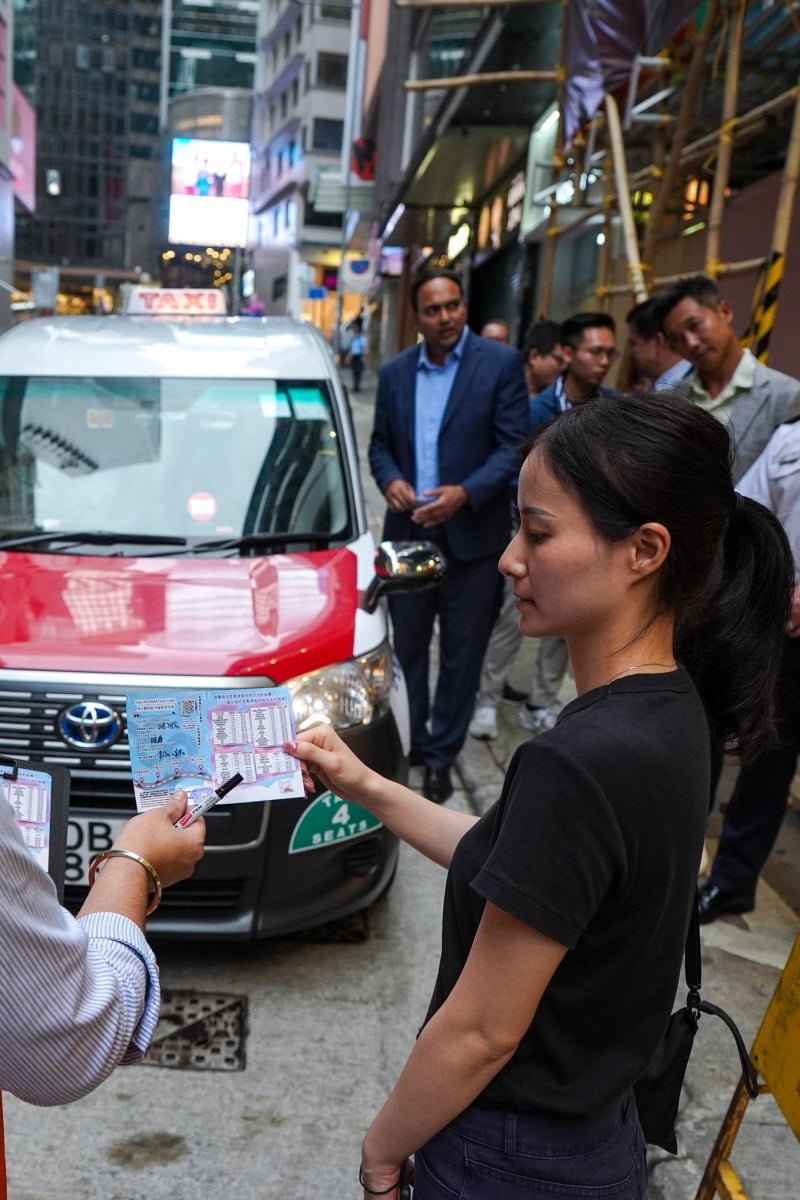
- Scheme led by the police force sends volunteers to Lan Kwai Fong on weekends to help passengers record ride information in case of complaints
- Demerit system, to be introduced later this year, lists 11 offences drivers could be penalised for, but some lawmakers say existing laws are enough
 “Taxi ambassadors” will help passengers in Lan Kwai Fong fill out information about their rides. Photo: Eugene Lee
“Taxi ambassadors” will help passengers in Lan Kwai Fong fill out information about their rides. Photo: Eugene LeeDeep Dive delves into hot issues in Hong Kong and mainland China. Our easy-to-read articles provide context to grasp what’s happening, while our questions help you craft informed responses. Check sample answers at the end of the page.
News: Hong Kong police recruit volunteers to help passengers avoid taxis overcharging
• Volunteers will help passengers fill out information cards detailing vehicle’s registration number, destination and estimated fare to follow up on complaints
• A three-month trial run will be held in Lan Kwai Fong, and police will consider expanding to other areas
Hong Kong police will station volunteers at taxi ranks in the city’s nightlife area during peak demand hours on weekends to stamp out driver misconduct.
From midnight to 5am on Saturdays and Sundays, volunteers will help passengers at taxi ranks on Wellington Street and Stanley Street in Central fill out information cards stating the vehicle’s registration number, destination and estimated fare before each journey.
“In case they have any complaints against the taxi driver, they can use [the card],” Terry Law Kwok-hoi, deputy district commander of the Central police district, said on Wednesday.
Law said the scheme, which began earlier this month and will last three months, will operate on a trial basis in Lan Kwai Fong, the city’s most prominent nightlife area and a popular tourist attraction, before authorities consider expanding it to other areas.
He added that the Central and Western District Road Safety Campaign Committee will recruit volunteers, some of whom will come from non-Chinese backgrounds.
A cab driver stationed near Lan Kwai Fong, who gave his surname as Chan, said the measure would better protect the reputation of law-abiding drivers.
“Everyone knows that some black sheep [of the industry] operate in Lan Kwai Fong, and we don’t want that,” Chan said. “We welcome this measure.”
But resident Joey Pathak-Dubey questioned the impact of the scheme: “In my personal experience, it’s very common for taxi drivers to overcharge in the [Lan Kwai Fong] area, but a lot of them are not at the taxi ranks themselves,” Pathak-Dubey said.
The 25-year-old Indian software engineer said a taxi driver once demanded HK$200 for a late-night trip from Hollywood Road to Caine Road in Mid-Levels last October.
“Friends of mine have had similar experiences,” Pathak-Dubey said. “It is more common for drivers to price gouge if you clearly look like a foreigner.”
Overcharging by cabbies has recently come under the spotlight after some tourists complained on social media. Police have carried out undercover operations to catch offenders, including a two-day crackdown earlier this year.
Last December, the government passed a bill introducing a demerit points system designed to clamp down on bad behaviour among taxies after a surge in complaints last year. The bill is expected to be introduced by the third quarter of this year.
Staff writer
Question prompts:
1. Which of the following statements is true, according to the article?
A. Taxi drivers usually overcharge foreigners.
B. The Hong Kong Police Force has stationed volunteers at popular tourist attractions in the city to help passengers with their taxi trips.
C. Hong Kong has passed a bill to boot out taxi drivers who overcharge.
D. Taxi drivers cannot be fined for overcharging or wilfully refusing to accept a fare.
2. List ONE reason why the police have stationed volunteers at taxi ranks in Lan Kwai Fong on the weekends.
3. Besides sending volunteers to taxi ranks, identify TWO other efforts the government has made to stamp out misbehaviour on the part of taxi drivers.
Table
Question prompts
-
Based on the Table and Glossary, what could happen if a taxi driver refused to accept a hire?
-
Using News, Table and Glossary, to what extent do you agree that the demerit points system could safeguard customers’ interests? Explain.
Issue: Lawmakers urge enforcing existing laws instead of demerits for taxi drivers
• Demerit system isn’t necessary because laws already exist regarding taxi misbehaviour, some lawmakers say
• Cab drivers expressed concerns about the bill, saying it has ‘grey areas’ and could lead to disputes
Some Hong Kong taxi drivers have expressed their dismay about a new demerit points system for taxi drivers, while lawmakers said authorities should focus on enforcing existing laws.
A driver in his 60s, surnamed Kam, said the system had many grey areas that could lead to disputes.
“If the route I take doesn’t meet their preferences, [the passenger] may accuse me of taking a detour,” Kam said.
Another driver, surnamed Wong, expressed similar concerns but agreed with some parts of the new system, such as penalties for overcharging.
But cabbies could have many reasons for refusing to pick up passengers, he said. For example, a driver who was about to finish his shift might decline a passenger who needed to travel far.
Lawmaker Doreen Kong Yuk-foon, who voted against the bill, accused the government of duplicating existing laws, noting that the Road Traffic Ordinance already covered 24 related offences, with some leading to a maximum penalty of six months in jail.
“The poorly behaved taxis at Canton Road in Tsim Sha Tsui and Garden Road [in Central] have become a part of Hong Kong. Have we ever truly put our efforts into cracking down on these taxis?,” Kong said.
Lawmaker Frankie Yick Chi-ming, who represents the transport sector, also voted against the scheme, saying it was unnecessary as long as existing laws were strictly applied and offending drivers faced legal repercussions.
“The court seldom imposes the maximum penalty, and the matter is often settled with a few thousand dollars, which has no deterrent effect at all,” he said. “The industry believes that heavy penalties should be given to drivers who overcharge or alter taxi meters. Once found guilty, they should be barred from driving taxis permanently.”
Staff writer
Hong Kong needs acts like Taylor Swift to boost tourism and local spending
Question prompts:
1. According to the article, what concerns do some cabbies have regarding the demerit points system?
(1) Taxi drivers might be accused of taking an unnecessary detour if the route does not meet the customer’s preference.
(2) The system has many grey areas that could put drivers at a disadvantage.
(3) Drivers could face legal repercussions for refusing to accept a hire even if they have legitimate reasons.
(4) People would prefer other modes of transport over taxis.
A. (1), (2) and (3) only
B. (2), (3) and (4) only
C. (1), (3) and (4) only
D. all of the above
2. To what extent do you agree with lawmaker Frankie Yick Chi-ming’s viewpoint that the demerit scheme has “no deterrent effect”?
3. Which of the solutions presented in News and Issue do you think would be most effective? Explain your reasoning.
Chart
Question prompts:
-
List ONE observation about the number of complaints against taxi drivers received in 2019 and 2023.
-
Using your own knowledge, explain a potential reason why Hong Kong recorded more cases of driver misconduct in the first eight months of 2023 than in the entire year of 2019.
Is Hong Kong doing enough to help poor children? Advocacy groups, experts say more must be done
Glossary:
price gouge: overcharging customers for goods or services, especially when demand is high and supplies are limited
black sheep: someone who stands out and causes shame or embarrassment because they don’t adhere to an accepted standard of behaviour.
demerit points system: a penalty system recently passed in Hong Kong under which taxi drivers will receive three, five or 10 demerit points for violating any of the 11 offences. Those who receive 10 or more points within a two-year period will be required to complete a taxi service improvement course at their own expense. Those who accumulate 15 points or more within two years may be disqualified from operating a taxi for three months. A six-month suspension will be imposed on repeat offenders.
grey areas: unclear or ill-defined situations that don’t fit neatly into a specific category or set of rules
detour: a longer or roundabout route taken to avoid something, visit somewhere, or make the ride last longer
Answers
News
1. B
2. To address the overcharging situation among the city’s taxi drivers.
3. The government carried out a two-day crackdown to catch offenders earlier this year and passed a bill introducing a demerit points system for taxi drivers.
Table
1. A driver could receive 10 demerit points for refusing to accept a hire, meaning they might have to complete a taxi service improvement course at their own expense. Drivers receiving 10 or more demerit points within two years are required to do so.
2. I agree that the demerit points system can safeguard customers, as offending drivers would be penalised with demerit points. To avoid losing money and keep their jobs, taxi drivers now have a reason to treat their customers respectfully. / I somewhat disagree that the demerit points system can safeguard customers, especially when they are trying to hail a cab, and the driver refuses to stop for them – they might not be fast enough to capture the number plate number. It could also be tough to prove that the driver purposefully refused the fare. (accept other reasonable answers)
Issue
1. A
2. I agree that the scheme has no deterrent effect since Hong Kong already has existing laws penalising offending drivers, but incidents still happen. Many drivers are willing to take risks for higher profits, especially after the pandemic, and the court seldom imposes the maximum penalty on drivers who break the laws already on the books. Heavier penalties need to be applied for the demerit points system to work. (accept other reasonable answers)
3. I believe heavier penalties, such as suspensions or losing their taxi license, should be used against repeat offenders. People who repeatedly misbehave or break the law will continue to do so if they don’t see real consequences for their actions. (accept other reasonable answers)
Chart
1. In the first eight months of 2023, Hong Kong had already recorded 745 cases of overcharging, more than the number recorded for the whole year in 2019. / The largest category of malpractice complaints is refusing passengers. (accept all reasonable answers)
2. Hong Kong recorded 2,701 complaints of alleged malpractice involving taxi drivers in the first eight months of 2023, higher than the pre-pandemic total of 2,298 cases recorded for the whole of 2019. One reason could be that the years-long pandemic and its related travel restrictions have significantly battered the business of drivers in Hong Kong. The city has seen an increase in tourists following the border reopening, and more people - combined with desperate drivers - means more risk of malpractice. (accept all reasonable answers)